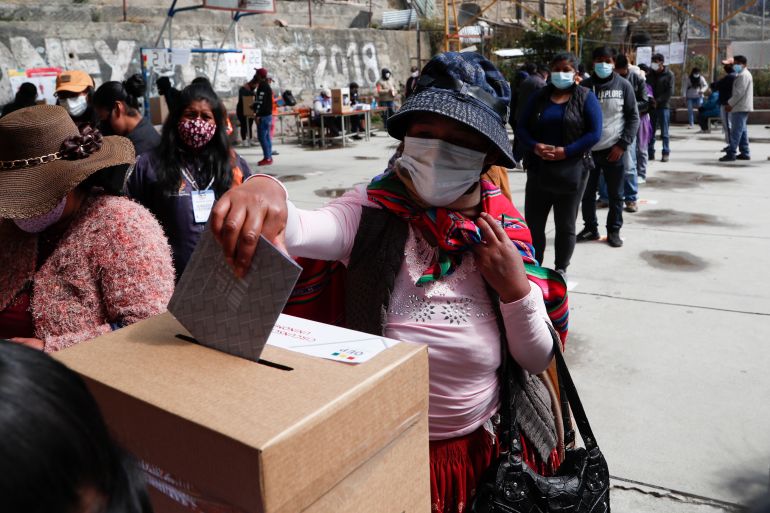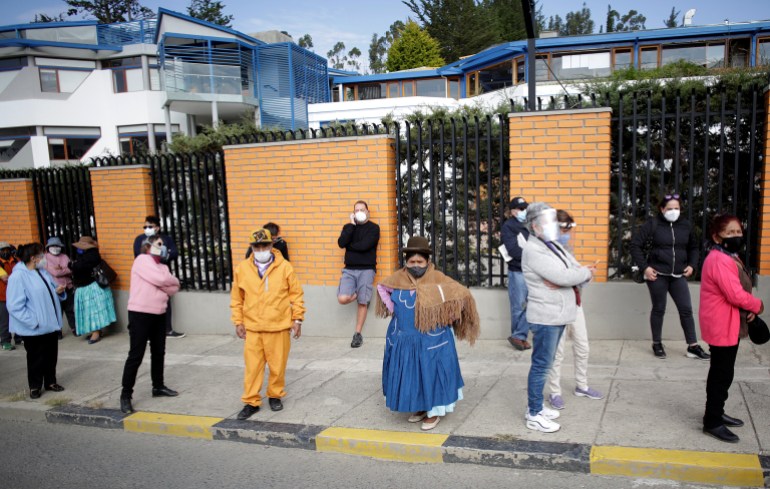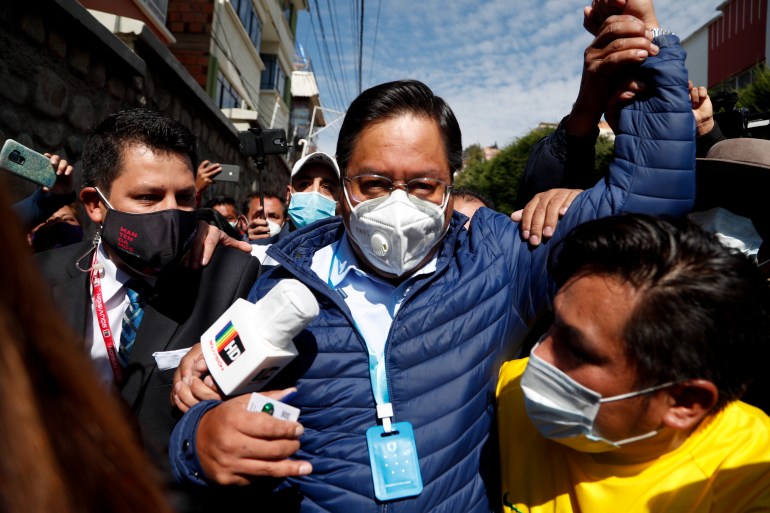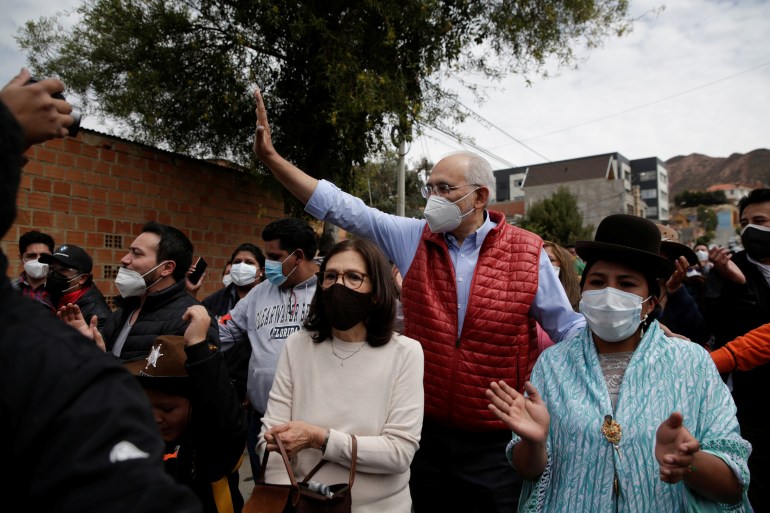Polls close in Bolivia’s high-stakes presidential election
Vote follows a year of political turmoil in the Andean nation following the removal of former President Evo Morales.

Bolivia’s interim President Jeanine Anez called for “patience” and urged citizens to avoid violence as they waited for the results from a high-stakes presidential election on Sunday, that many hope can restore stability to the country after a voided ballot last year plunged the Andean nation into political crisis.
Results are expected to be slower than usual as the Electoral Tribunal suspended the customary rapid count, arguing that it was unable to guarantee the accuracy.
Keep reading
list of 4 itemsBolivia sees more unrest following opposition leader’s arrest
Clashes in Bolivia after judge orders opposition leader detained
Census delay sparks deadly strikes in Bolivia’s Santa Cruz region
“Patience, we must all be patient waiting for the results without generating any type of violence,” said Anez, who is not standing for president.
“I assure you we will have credible results.”
The election is the first in 20 years not to feature former president Evo Morales, the country’s first Indigenous president who resigned and fled the country late last year following weeks of protests over his claimed election win.
An unofficial quick-count showed Movement for Socialism (MAS) candidate Luis Arce well ahead of his most serious challenger, centrist former president Carlos Mesa.
The count from from Ciesmori, released by Bolivian TV channel Unitel, gave Arce 52.4 percent of the votes compared with 31.5 percent for Mesa, which would mean he could win the election without the need for a run-off.
Despite a tense and polarised campaign, the election took place peacefully. Some polling stations had to remain open beyond their 5pm (21:00 GMT) closing time because there were queues of people still waiting to vote.
“We’ve had a calm day throughout the whole country up until now,” Deputy Security Minister Wilson Santamaria said in a statement.
Both Arce and Mesa have been critical of the decision to suspend the rapid count, with Arce saying the delay “could generate doubts.”
If no candidate wins sufficient votes there will be a run-off next month.
Political reset
Sunday’s vote is an attempt to reset Bolivia’s democracy.
“Bolivia’s new executive and legislative leaders will face daunting challenges in a polarised country, ravaged by COVID-19, and hampered by endemically weak institutions,” said the Washington Office on Latin America, a Washington-based human rights advocacy organisation.

It may be days before Bolivians have a good idea of who won. While some independent groups will operate selective quick-count surveys, the country’s Supreme Electoral Court announced late on Saturday it had decided unanimously against reporting running preliminary vote totals as ballots are counted.
It said it wanted to avoid the uncertainty that fed unrest when there was a long halt in reporting preliminary results during last year’s election. At least 36 people were killed in that violence.
Council President Salvador Romero promised a safe and transparent official count, which could take five days.
To win in the first round, a candidate needs more than 50 percent of the vote or 40 percent with a lead of at least 10 percentage points over the second-place candidate. A runoff vote, if necessary, would be held on November 28.
Bolivians are also electing a new 136-member Legislative Assembly.
The election was postponed twice because of the coronavirus pandemic. On a per-capita basis, few countries have been hit harder than Bolivia: Nearly 8,400 of its 11.6 million people have died of COVID-19.
Morales absent
Arce was an economy minister in Morales administration and led an extended boom, while his main rival, Mesa, is a centrist historian and journalist who was second to Morales in the disputed returns released after last year’s vote.
Trailing in all the polls has been Luis Fernando Camacho, a conservative businessman who helped lead last year’s uprising, as well as a Korean-born evangelist.

Overshadowing the vote is the absence of Morales, who first secured power in Bolivia in 2006 and was a key figure in the bloc of leftist leaders who held power across much of South America. Morales, now exiled in Argentina, was barred from running for the presidency or even the Senate by electoral authorities following his removal.
He chose Arce as his stand-in for the Movement Toward Socialism party, and a win by the party would be seen as a victory for Latin America’s left.
A boyhood llama herder who became prominent leading a coca grower’s union, Morales had been immensely popular while overseeing an export-led economic surge that reduced poverty during most of his term. But support was eroding due to his reluctance to leave power, increasingly authoritarian impulses and a series of corruption scandals.
He shrugged aside a public vote that had set term limits and competed in the October 2019 presidential vote, which he claimed to have narrowly won outright. But a lengthy pause in reporting results fed suspicions of fraud and nationwide protests broke out.
When police and military leaders suggested he leave, Morales resigned and fled the country.

Conservative Senator Jeanine Anez proclaimed herself president and was accepted by the courts. Her administration, despite lacking a majority in congress, set about trying to prosecute Morales and key aides while undoing his policies, helping prompt more unrest and polarisation.
She dropped out as a candidate for Sunday’s presidential election while trailing badly in polls.